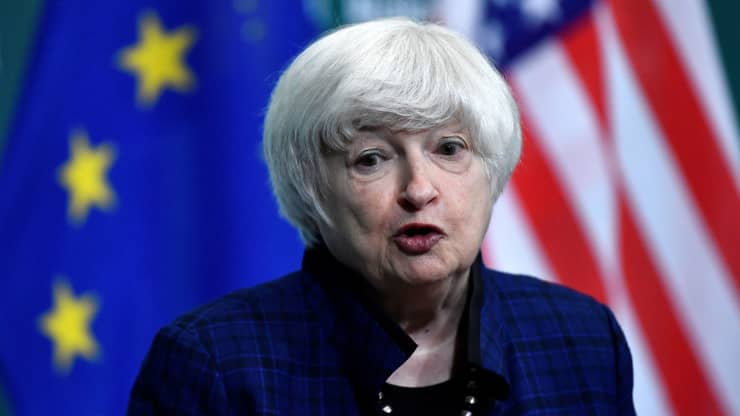 Oil pumping jacks, also known as “nodding donkeys”in a Rosneft Oil Co. oilfield near Sokolovka village, in the Udmurt Republic, Russia, on Friday, Nov. 20, 2020. Bloomberg | Bloomberg | Getty Images
Oil pumping jacks, also known as “nodding donkeys”in a Rosneft Oil Co. oilfield near Sokolovka village, in the Udmurt Republic, Russia, on Friday, Nov. 20, 2020. Bloomberg | Bloomberg | Getty Images
The U.S. Treasury Department clarified Friday afternoon that Wall Street’s traders and banks can continue to buy and sell Russian oil and gas despite a raft of sanctions against Russia and its largest lenders.
The new guidance comes as traders and banks worry about running afoul of U.S. trade laws as world leaders rally against Russian President Vladimir Putin’s unprovoked invasion of Ukraine.
But Treasury underscored in a post that the U.S. sanctions against Russia’s biggest banks — including VTB Bank — do not apply to energy transactions until June 24. The department also reassured investors that companies that transport Russian energy commodities for sale to the U.S. are also except from the penalties.
“In general, energy-related activities — including the purchase, sale, or transport of Russian-origin oil, gas, or other energy-related products by U.S. or non-U.S. persons — remain permissible,” Treasury said on its website. “The energy sector of the Russian Federation economy itself is not subject to comprehensive sanctions.”
The update from Treasury, which enforces the majority of U.S. sanctions and tariffs, comes amid wide speculation that the U.S. could soon opt to bar Russian energy imports in addition to the raft of already-announced penalties against the Kremlin.
Oil jumped another 7% on Friday in a volatile session as Russia’s invasion of Ukraine continued to roil markets in New York and Chicago. Crude futures have soared more than 20% since the United States and allies sanctioned Moscow in late February between a disruption in sales out of Russia and uncertainty about how long the war could last.
Brent futures rose $7.65, or 6.9%, to settle at $118.11 a barrel, while U.S. West Texas Intermediate crude rose $8.01, or 7.4%, to settle at $115.68. That was the highest close for Brent since February 2013 and for WTI since September 2008.
 U.S. Treasury Secretary Janet Yellen speaks during a news conference with Irish Finance Minister Paschal Donohoe at Government buildings in Dublin, Ireland, November 1, 2021. Clodagh Kilcoyne | Reuters
U.S. Treasury Secretary Janet Yellen speaks during a news conference with Irish Finance Minister Paschal Donohoe at Government buildings in Dublin, Ireland, November 1, 2021. Clodagh Kilcoyne | Reuters
The latest spike in oil came earlier on Friday as comments from the White House fueled speculation that an outright ban on U.S. imports of Russian energy could be imminent.
Administration officials said the U.S. economy could likely withstand the impact of an outright ban on Russian crude imports if it works with its international partners. Russia is one of the globe’s largest energy exporters and its sales of energy to the U.S. are one of the remaining ways Moscow can access U.S. dollars while its own currency tumbles.
“We’re in a very good position, and what we know from the U.S. economy is that we don’t import a lot of Russian oil,” said Cecilia Rouse, chair of the White House Council of Economic Advisers on Friday.
“We are looking at options that we can take right now if we were to cut the U.S. consumption of Russian energy,” she said. “But what’s really most important is that we maintain a steady supply of global energy.”
The threat of forthcoming sanctions against Russia’s energy sector has some energy traders on edge since so much of the energy market is based on futures contracts — agreements to purchase oil or gas at a specified price months in the future.
Many traders have asked the Treasury Department in recent days if they will have to wind down energy-related transactions by June 24.
If the Biden administration fails to renew the special carve out for Russian energy exports by June 24, the Office of Foreign Assets Control will issue another license that will advise traders on how to orderly wind down energy contracts, Treasury said.

